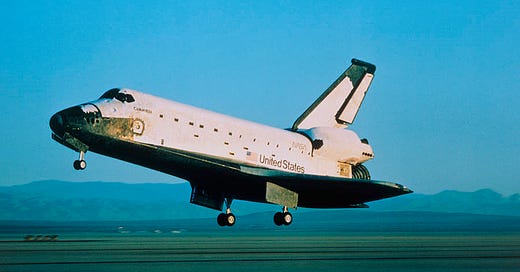By guest author Jon from Knights of Dissent.
On February 1, 2003, the Space Shuttle Columbia disintegrated upon re-entering Earth’s atmosphere, resulting in the deaths of all 7 crew members. The disaster was mourned all over the United States, which at the time was preoccupied with the domestic and international strife caused by the War on Terror. Tragically, this event did not stick in the public consciousness, and in the tumult of modern America, its bidecadal anniversary last year passed by relatively unnoticed.
The Human Cost of Manned Space Travel
The Columbia disaster was by no means the first instance of casualties in America’s pursuit of space travel. The public-school textbook version of NASA’s creation and the Apollo Program leaves out the true dangers of the endeavor, including the risky transonic test flights and spaceplane experiments in the two decades preceding the first manned lunar mission. The 2018 film First Man, by director Damien Chazelle, manages to capture some of the intense anxiety felt by the astronauts and their families. This includes a depiction of the Apollo 1 training fire, which resulted in the deaths of all three crew members. I believe that the grim reality of manned space flight, especially in the early years, makes the courage and will of the surviving astronauts all the more astounding. It is reminiscent of the Jamestown and Plymouth colonists, who faced a daily possibility of death and persisted through.
By ignoring the death and hardship, regime education neuters the story of these heroes. They cannot yet slander them as “bigots” or “racists,” as many of these brave Americans are still living and able to defend their honor; so, instead, the regime plays a highlight reel of the successes, ignoring the lives lost. It is no surprise, then, when members of the public so often ask themselves, “Why can we not travel to the Moon today with our more advanced technology?” The true barrier to mankind’s future in space is not a technological one, but a vital one. What allowed America to set foot on the Moon the first time was a mature acknowledgment of death and a vitality of the will sufficient to act in spite of death.
Howard C. Lilly was a test pilot for NACA (the predecessor of NASA). Lilly was killed on May 3, 1948, when his transonic D‑5558‑1 experimental aircraft crashed. Despite being the first NACA pilot to lose his life, Lilly does not even have a Wikipedia page.
Major Michael J. Adams was killed on November 15, 1967, when his X‑15 experimental spaceplane went out of control and dove at 160,000 feet per minute, partially disintegrating in midair from extreme g-force.
A Day for Remembrance
In honor of those Americans who sacrificed their lives so that mankind may one day become an interstellar species, I propose a holiday, to be observed annually. I moreover propose that the date should be set halfway between the summer and winter solstices on the date of the spring equinox, as it is then when the Earth is in equal light and darkness. This year, it will fall on Tuesday, March 19.
NASA already observes an annual remembrance event for fallen astronauts every January, but this event is not widely publicized, nor has it been firmly established in the eyes of the public.
I am suggesting that the equinox be henceforth known as Cosmic Pioneer Day. We will promote it in the same way as other interest groups have promoted their holidays and martyrs, through petitioning at a local and, eventually, at a state level to have it recognized and observed in schools.
It is worth also explaining why I believe such a holiday to be necessary, as it seems that the American space project is far from the minds of the pessimistic public. But it is precisely this pessimism on the part of the public that sets us apart. We are not pessimists, and our ambitions lie in the stars. Our vision for America is a vision that will, if we prevail, advance mankind’s destiny of interstellar dominance. Many have given their lives in the pursuit of this ambition, as so many of our pioneer ancestors perished in the conquest of the American continent. No doubt, many more will give the ultimate sacrifice before this dream is realized. It is fitting that a public holiday be observed to honor this reality and celebrate the unmatched will of Columbia.









The Regime doesn't seem to want to celebrate bravery, or anything that might inspire true accomplishment. They'd rather make up stories about Margaret Hamilton and how she led the team that created the on-board flight software for the Apollo missions.
Thanks for writing this. I grew up in Houston and this event was very significant in my community. I’m glad to see it’s not lost upon all.